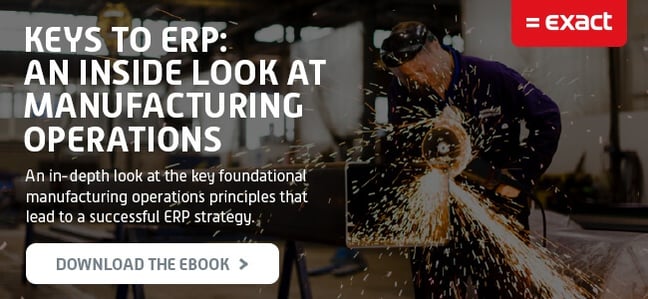 While it’s a convenient way to capture transactions and costs, a company’s ERP system actually improves employee productivity in a number of ways that are not necessarily easy to quantify. While all the productivity improvements help contribute to the ROI of the ERP investment, some companies overlook these productivity gains.
While it’s a convenient way to capture transactions and costs, a company’s ERP system actually improves employee productivity in a number of ways that are not necessarily easy to quantify. While all the productivity improvements help contribute to the ROI of the ERP investment, some companies overlook these productivity gains.
1. Improved communication
With built in exception reporting and workflow alerts, modern ERP systems help ensure rapid and accurate communication when problems occur or priorities change. The system sends sales order changes to the warehouse or shop floor immediately, to prevent shipping errors or overproduction. It also notifies suppliers of changes in demand and helps teams to coordinate projects or complex orders.
2. Reduced “busy work”
Without a modern ERP system, companies are forced to use resources to accomplish non-value added tasks such as matching and stapling matching invoices with receipt paperwork, filing sales order acknowledgements, or copying documentation and procedures with every shop floor order.
When these non-value-added tasks are eliminated, people can turn their time and attention to more productive tasks, such as improving customer and supplier relationships. The result is not only more productive employees, but also happier employees—which reduces employee turnover.
3. Industry best practices
Modern ERP systems have been successfully implemented in hundreds, if not thousands, of companies. As a result, the standard business process flows built into the system reflect industry best practices and usually eliminate extra steps. By adopting these built-in best practices, the company often enjoys a large productivity boost with very little or no investment in business process engineering and analysis.
This is especially important for small and mid-sized companies, which need to squeeze every drop of productivity that they can from their investments in order to compete with larger companies who have more resources.
4. Supports fact-based decisions
Without an ERP system, employees are forced to rely on guesswork or rules of thumb when they need to make decisions. To protect themselves, employees often spend large amounts of time creating and maintaining personal spreadsheets that they hope will provide the information they need in a crunch.
Unfortunately, unlike an ERP system, which provides the real time status information necessary with just a few keystrokes, relying on spreadsheets leaves the company without access to the latest information. As a result, employees may make sub-optimum decisions. Even worse, different employees may have different information in their spreadsheets, resulting in wasted time while they reconcile the variations.
5. Eliminates duplicate data
Not only does relying on spreadsheets waste employee time in the creation and maintenance of the data, as mentioned above, but variations also creep in to spreadsheets that are updated at different times, from different sources, or from using different calculations. As a result, employees spend a great deal of their time reconciling and coordinating their varying spreadsheets.
Even if the company relies on automated systems for parts of its business, the problem of maintaining duplicate data may exist. Customer records must be maintained in accounting systems to manage receivables, and the same data must be maintained in order management systems. The same holds true for supplier information. Item records and general ledger charts of accounts usually have to be maintained in every system, resulting in a nightmare of discrepant records.
Using an ERP system automatically provides necessary information to all areas of the business using a single data repository. Coupled with the other items on this list, it’s clear that ERP improves employee productivity in countless ways.






